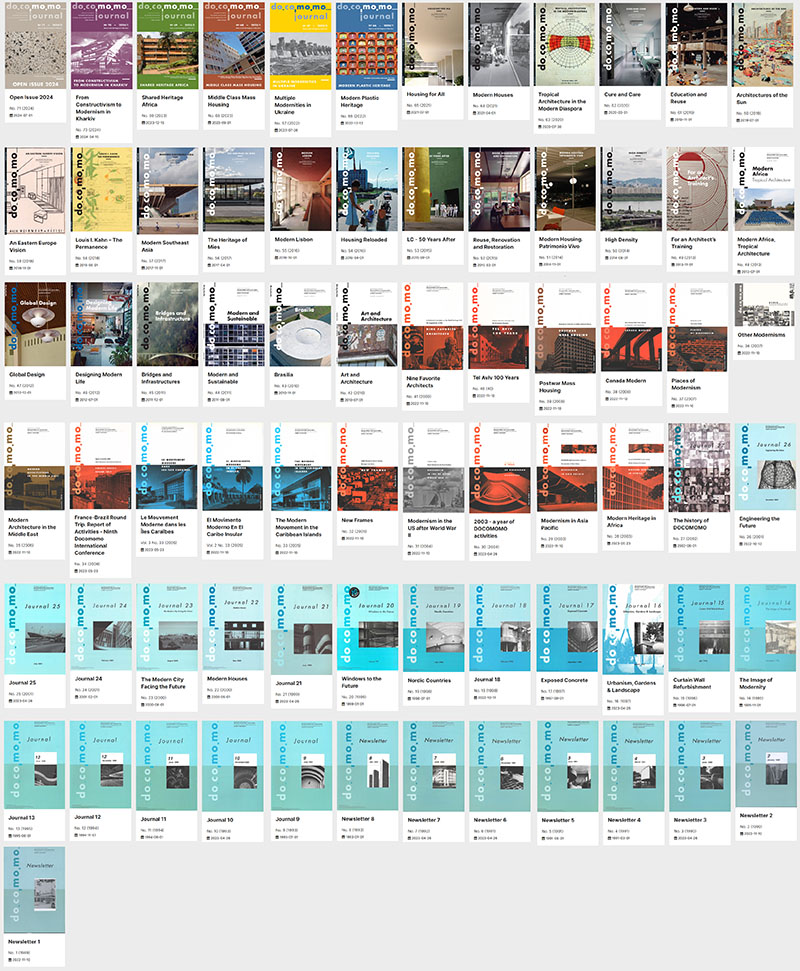Additional Files
DOI:
https://doi.org/10.52200/docomomo.71.01Abstract
Docomomo International is proud to present the first Open Issue of the Docomomo Journal. Creating the opportunity for scholars, practitioners, policy makers, activists or any other group of authors to publish in our journal without having to wait for a thematic Special Issue on a theme that would fit their topic felt like the logical next step in (the continued) continuing professionalization of the Docomomo Journal.
In the plan of action for the candidacy of Delft University of Technology as the new headquarters for Docomomo International – presented in 2021 – open access to the journal and expansion of its reach was advocated:
“In addition, Docomomo International aims to involve the Docomomo network more actively into the production of content – in particular linked with the new biannual conferences, seminars and workshops related to digitization, education and sustainability. This will strengthen the role of the Docomomo Journal as a link between Docomomo members, the Docomomo chapters to serve the Docomomo network, and its impacts on professional practices and the general public.”
The Open Issue aims for contributions that do not fit within the topic of the thematic Special Issues but fit the overall scope of the Docomomo Journal. All contributions to this open issue have had the same peer reviewing process, but instead of organized by guest editors, now under the wings of the editors-in-chief. The 2024 Open Issue features articles on the Lagoa Rowing Stadium in Rio de Janeiro, industrial heritage in Egypt and Iran, on Erik Gunnar Asplund’s Stockholm public library, the transformation of a former hospital to a criminal justice complex in São Paulo, and the House of Manoel Coelho in Curitiba.
The creation of a yearly Open Issue in addition to the two regular thematic Special Issues is the next step in the evolution of the Docomomo Journal, that once started as a simple Newsletter and evolved into an academic peer-reviewed and indexed journal (figure 1). The first Newsletter was published in 1989 and changed into a Journal in 1993 (no. 9). Starting with no. 28 in 2003 the lay-out and graphics of the Docomomo Journal changed tremendously, marking the transition into a more academic oriented journal. Another change in graphics took place in 2010, starting with no. 42 and Ana Tostões and Ivan Blasi as editors, also marking the move towards online publication of the individual articles in the Docomomo Journal. In 2022, with the special issue on Modern Plastic Heritage (no. 66) a new lay-out and publication scheme was adopted to accommodate fast online and open access publication of new issues of the journal and its individual articles.
The 2024 Open Issue (no. 71) marks the newest development and we call upon the Docomomo Community to continue using, referencing and contributing to the Docomomo Journal, not only to the thematic Special Issues, but also to the Open Issues.
How to Cite
Published
Issue
Section
License
Copyright (c) 2024 Uta Pottgiesser, Wido Quist

This work is licensed under a Creative Commons Attribution 4.0 International License.





